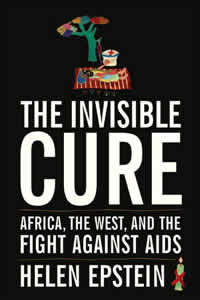Book Notes
 Helen Epstein, The Invisible Cure; Africa, the West, and the Fight Against AIDS (New
York: Farrar, Straus, and Giroux, 2007), 326pp.
Helen Epstein, The Invisible Cure; Africa, the West, and the Fight Against AIDS (New
York: Farrar, Straus, and Giroux, 2007), 326pp.
"As a woman living with HIV," says Beatrice Were of Uganda, "I am often asked whether there will ever be a cure for HIV/AIDS, and my answer is that there is already a cure. It lies in the strength of women, families and communities who support and empower each other to break the silence around AIDS and take control of their sexual lives." With a vaccine against HIV far off in the distant future (if at all), and with treatment of AIDS in the two-thirds world difficult, expensive, and limited in effect, the name of the game in HIV-AIDS is prevention. But in places like Africa, which is the focus of Helen Epstein's book, prevention is not as simple as it sounds. As she notes in her appendix, measles, syphilis, tuberculosis, and other entirely preventable diseases still kill millions of people even though they can be treated for pennies.
Why has HIV-AIDS ravaged eastern and southern Africa like no place on earth? "In 2005," she writes, "roughly 40 percent of all those infected with HIV lived in just eleven countries in this region— home to less than 3 percent of the world's population." In some of these countries the infection rates have hit 30 percent, decimating the general population, while in the west, for example, rates hover at about 1% and are generally limited to specific demographics like gay men, intravenous drug users, and commercial sex workers." Theories abound about this discrepancy, but Epstein argues a narrow point, that Africa's problem is not profound promiscuity, or even the normal culprits of high risk groups like prostitutes or truck drivers, but instead a social phenomenon of "concurrent partners." That is, Africans do not have more sexual partners than in other places in the world, and nowhere near as many as gay men among whom infection rates are exponentially lower; but they do have a small number of sexual partners concurrently, at the same time, rather than one at a time or sequentially. This has set the virus loose among the general population like a runaway train.
And why has prevention been so elusive? Epstein appeals to what she calls the comprehensive "social ecology" of denial, silence, shame, adverse gender roles, and stigma about HIV-AIDS. Western-initiated and donor-funded programs will always be less successful than listening to Africans themselves and their own suggestions about how to address the problem. Uganda, of course, has been the amazing success story in this regard, and the subject of bitter debates about why. In 1989 Uganda had one of the highest infection rates in the world, but from about 1992–2002 the infection rate dropped by two-thirds. The key to the success, argues Epstein, was not in the billions of dollars from the west, but from the "collective efficacy" of a "shared calamity," by people helping each other and talking openly about the scourge. In particular, "partner reduction," she says, and not the much vaunted condom use, helped Ugandans to address the cultural phenomenon of concurrent partners. Partner reduction, as one worker described it, is thus the "neglected middle child of the ABC approach" of abstinence, fidelity ("be faithful"), and condoms. Zero Grazing, as Uganda's president Yoweri Museveni called for, is thus the silent cure already available, however valuable other prescriptions.
Epstein, a molecular biologist who has written widely on public health issues, combines rigorous science and the anecdotal evidence of substantial field research. She's clearly as comfortable with and interested in meeting with a dozen African widows under a mango tree as she is in the latest results of a demographic study. Her book has received strong reviews in the New York Times and the New York Review of Books (where her mother was a co-editor before she died), and also a rebuttal of sorts on the home page of UNAIDS that was provoked by her somewhat conspiratorial stance toward research that she argues they ignored because it didn't fit their partisan ideology.


